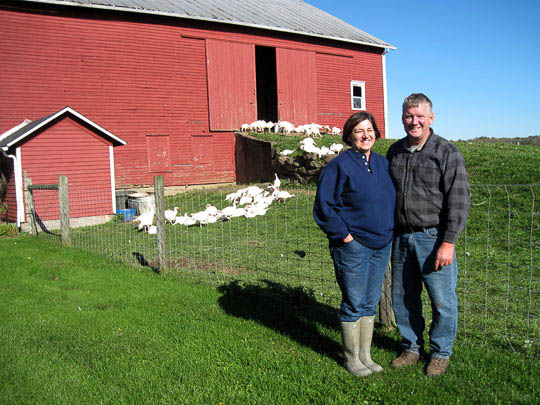A Groundbreaking Commitment to Animal Welfare
Food service provider says no more gestation crates and battery cages, period
PALO ALTO, CA (Feb. 21, 2012)—Bon Appétit Management Company, which operates more than 400 cafés for corporations, universities, museums and specialty venues in 31 states, announced the rollout of the food service industry’s most comprehensive farm animal welfare policy to date, to applause from The Humane Society of the United States.
“Bon Appétit has turned ‘very good’ into ‘great,’ setting a new high-water mark in the food-service sector,” said Wayne Pacelle, president and CEO of The Humane Society of the United States. “Consumers are deeply concerned about animal welfare, and Bon Appétit is responding.”
As part of the new policy, Bon Appétit is:
- Requiring that all pork it serves — currently 3 million pounds annually — be produced without gestation crate confinement systems, using higher-welfare group housing systems instead.
- Switching all of its pre-cracked (liquid) eggs — currently 11 million eggs annually — from hens confined in barren battery cages to hens living in cage-free farms, as it already does for shell eggs.
- Entirely eliminating foie gras (livers of force-fed ducks) and veal from calves confined in crates from its menus.
- Ramping up efforts to seek out the most responsible meat, poultry and egg producers — those who have received at least one of the four highest animal-welfare certifications.
All of these important reforms will be phased in by 2015. The company will also continue to offer and promote vegetarian options daily as part of its Low Carbon Diet initiative, which was introduced in 2007.
In addition to other socially responsible practices, the company has used exclusively cage-free whole eggs since 2005 and endorsed legislation to outlaw gestation crates. Eight states have now passed such laws. It has also fought against the routine use of antibiotics in farm animals, both to safeguard their efficacy in humans and to end the factory-farm conditions they enable.
“I have never forgotten the terrible things I saw when touring factory farms,” said Fedele Bauccio, cofounder and CEO of Bon Appétit Management Company. From 2006 to 2008 Bauccio served on the prestigious Pew Commission on Industrial Farm Animal Production, which issued a landmark report calling for an end to gestation crate, battery cage, and veal crate confinement of farm animals.
“We’ve been asking the industry to do the right thing, but we can’t wait anymore,” Bauccio said. “We have to send the message that these practices are unacceptable. If the supply doesn’t catch up by our deadline, we’ll do what we have to — even if that means cutting back on bacon.”

Melissa and Aaron Miller of Miller Livestock in Kinsman, Ohio, who recently received Food Alliance certification for their pastured pork and lamb. Bon Appétit buys half of all the hogs the Millers raise and “really pushed us to take it to the next level,” says Melissa Miller. “We would not have pursued it without their support. They even offered to reimburse us for the fees. We are thrilled to be the first Food Alliance-certified ranch in Ohio!” Photo by Piper Fernwey, Bon Appétit.
Bon Appétit will continue to work with the most responsible meat and poultry producers to pursue Animal Welfare Approved, Food Alliance, Humane Farm Animal Care or Global Animal Partnership certification of their animal welfare practices. These four programs have standards that not only prohibit such cruel practices as gestation crates and battery cages, but also require animals to be allowed to engage in their natural behaviors.
Bon Appétit vows that by 2015, 25 percent or more of its meat, poultry and egg purchases companywide will be sourced from producers that meet at least one of these four certifications. The company has always encouraged the best farms amongst its suppliers to get the recognition they deserve. This announcement sets an important new baseline for the minimum standards it will accept.
Update: Read our March 2016 progress report
#
About Bon Appétit Management Company
Bon Appétit Management Company (www.bamco.com) is an on-site restaurant company offering full food-service management to corporations, universities, and specialty venues. Based in Palo Alto, CA, Bon Appétit has more than 400 cafés in 31 states, including eBay, the University of Pennsylvania, and the Getty Center. A pioneer in environmentally sound sourcing policies, Bon Appétit has developed programs addressing local purchasing, the overuse of antibiotics, sustainable seafood, cage-free eggs, the connection between food and climate change, and, most recently, farmworker welfare. The company has received numerous awards for its work from organizations such as the James Beard Foundation, Chefs Collaborative, Natural Resources Defense Council, Seafood Choices Alliance, The Humane Society of the United States, and Food Alliance. Its dining operations at Wheaton College in Illinois were voted Best College Food among 122,000 college students surveyed by the Princeton Review in 2011.
About The Humane Society of the United States
The Humane Society of the United States is the nation’s largest animal protection organization—backed by 11 million Americans, or one of every 28. For more than a half-century, The HSUS has been fighting for the protection of all animals through advocacy, education, and hands-on programs. Celebrating animals and confronting cruelty—on the web at humanesociety.org.